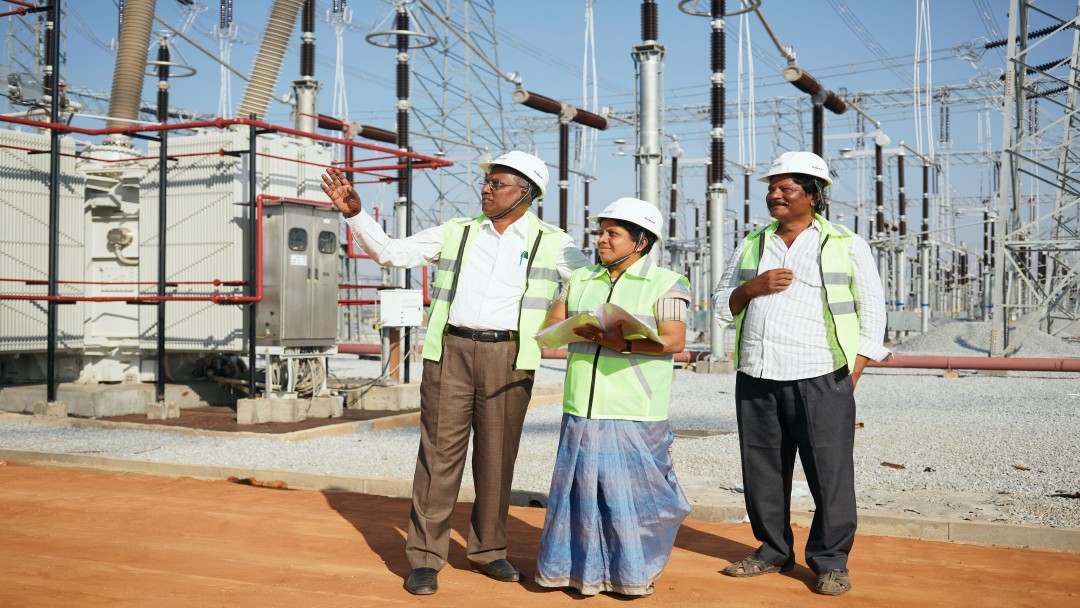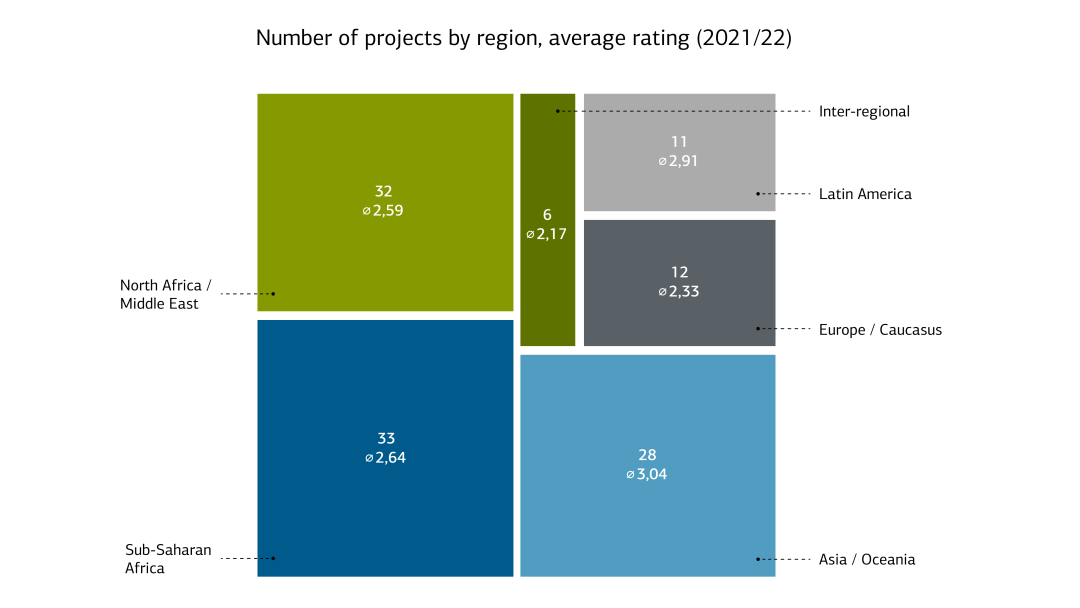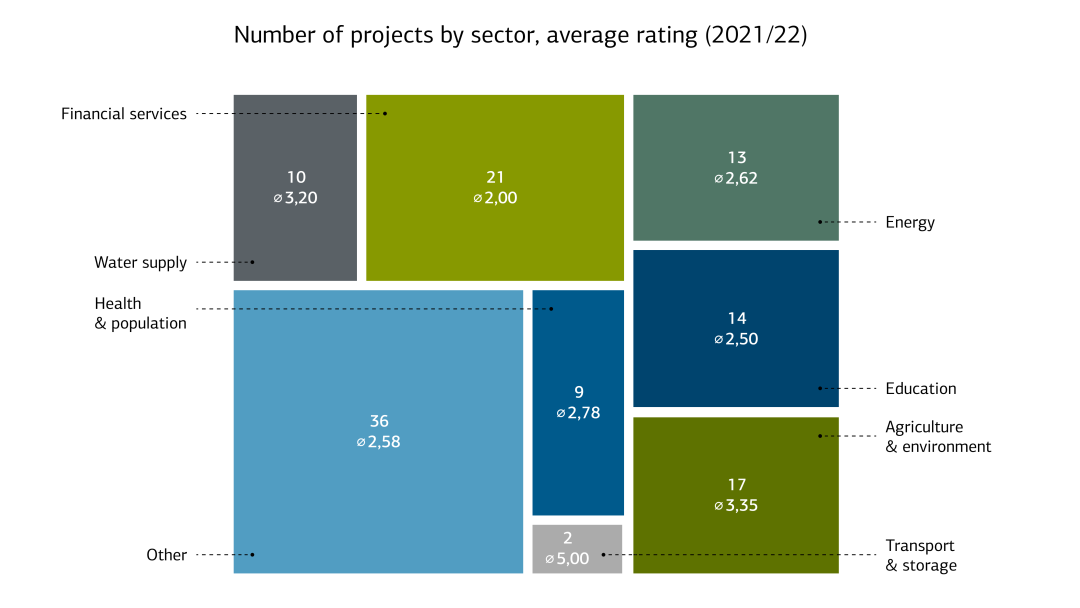News from 2023-10-13 / KfW Development Bank
KfW presents 17th Evaluation Report
“Evaluate – Measure – Learn”. This is the title under which the Evaluation Unit of the KfW presented the 17th Evaluation Report on the impact of Financial Cooperation (FC) with developing countries and emerging economies. The report is published on a biennial basis. The impact of the 152 measures promoted on behalf of the Federal Ministry for Economic Cooperation and Development (BMZ) with a total volume of EUR 4.9 billion was examined by KfW's Independent FC Evaluation Unit in 2021/2022. In the random sample, which represents the entire portfolio of completed programmes, 84% of the projects were classified as successful, meaning they were rated with at least a 3 in a rating system on a scale from 1 to 6 based on the OECD-DAC criteria. The average score was 2.6, half of the projects (51%) achieved success level 2 (successful) and about one third (31%) achieved overall result 3 (with limited success). A total of nine projects with a total score of 4 and 5 is no longer considered successful. Only one project scored a total score of 1 (very successful).

“Evaluation is not an end in itself, as measuring the impact of KfW Development Bank’s projects is becoming increasingly important for the success of the projects. Constructive support, critical evaluation and learning from mistakes through advanced in-house interaction instruments are invaluable for future projects, as they strengthen their effectiveness. This perfectly aligns with the UN Agenda 2030 and its Sustainable Development Goals, which KfW is taking into account as part of the step-by-step introduction of group-wide impact management within the scope of the KfWplus strategy. KfW believes that it has a responsibility to systematically record the economic, environmental, and social impacts of its promotional activities, to make them transparent and to derive appropriate control impulses for greater effectiveness. We need to readjust the benchmarks and measure our success more strongly in the future by the impact of our funding,” says Christiane Laibach, Member of the Executive Board for International Financing at KfW Group.
The evaluation department is increasingly seeing itself as a knowledge hub that is continuously using new tools, including an increasing number of digitalFor example, with the new IDEaL app the evaluation results gathered by KfW Development Bank are systematically presented and made available to the general public. Here, the user can find digitalized results from over 1,100 evaluations carried out since 2007. With just a few clicks, access can be gained to evaluations that are needed for planning new projects and that provide invaluable information on factors that can determine either success or failure.
“We want to continuously improve how we measure the impact of KfW Development Bank’s projects and at the same time make it digitally usable. In addition to comprehensive digitalization, we are increasingly applying rigorous impact evaluation methods to the evaluation process. The initiators of these methods were awarded the Nobel Prize in Economic Sciences in 2019, and their methods allow precise measurement of a project’s impact. We implement them from the very start of selected FC projects, and in doing so provide a supplement to the comprehensive ex-post evaluations”, says Professor Kluve, Head of the Evaluation Unit at KfW.
State of the art satellite technology for monitoring deforestation in the Amazon
KfW uses state-of-the-art satellite technology to monitor deforestation in the Amazon. This is one of the subjects of the 17th evaluation report on the effectiveness of the FC. In order to answer the question whether forest protection projects of KfW Development Bank have prevented worse outcomes despite forest loss in nature reserves, the new method of so-called rigourous impact evaluation has been developed based on current research results. The innovative approach compares forest areas financed with those not financed. The commitment of the FZ and its partners significantly reduces deforestation in protected areas, with around 8% more forest area than comparable forest areas without support. This corresponds to the size of around 8 million football pitches over the period 2001-2020.
Additional results from the 17th Evaluation Report
About half of the evaluation portfolio, is located in the Sub-Saharan Africa and North Africa/Middle East regions: this reflects the high number of FC projects on the African continent. With an average of 88% and 94%, the success rates in both regions are ahead of all other regions. At 68% and 73%, the success rates in the Asia/Oceania and Latin America regions in particular are significantly lower.

From a sectoral perspective, we can clearly see that the financial sector – measured by the number of projects evaluated – is not only the largest individual sector, but also achieves the best average rating with 2.0.

More details about our evaluation results for 2021 and 2022 can be found here:

Share page
To share the content of this page with your network, click on one of the icons below.
Note on data protection: When you share content, your personal data is transferred to the selected network.
Data protection
Alternatively, you can also copy the short link: https://www.kfw-entwicklungsbank.de/s/enzBWrMC.C_EA
Copy link Link copied